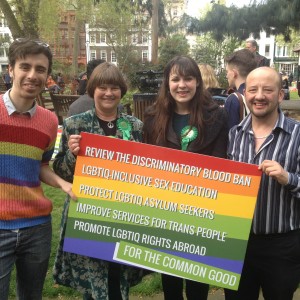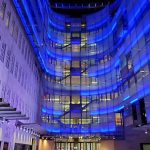Charlie Kiss: ‘We are much more varied than people think’

Charlie Kiss is the Green Party’s Parliamentary candidate for Islington South and Finsbury. Bright Green caught up with him on the last stretch of campaigning before the General Election on Thursday.
Charlie, you are the only out trans man standing in the upcoming General Election. But who are you outside of politics?
At the moment, I don’t really have a life outside of politics. When not at work, I’m either in hustings, canvassing, leafleting or going to political meetings. Currently I work for local government in housing repairs. Prior to this I worked in the printing industry for about 15 years.
My life has been quite a roller-coaster, what with becoming involved with Greenham Common women’s peace camp from the age or 17, being imprisoned for the actions taken there, suffering a breakdown and being homeless in my early 20s, then finally changing my name in 2000 when 35 and starting the process of transitioning from female to male– these experiences have made me want to speak up for people in these situations and try and make people understand a bit better that people who don’t get such a good deal out of society, are usually from less stable family backgrounds with not much security. Also the complications of coming out as trans; going through a second puberty and having biological changes and many operations was another major complication but life is infinitely better now. Being a parliamentary candidate has been a great experience I have learnt a lot but afterwards, provided I am not elected of course, I have decided to devote some time to completing my autobiography and hopefully have it published.
Tell us about how you ended up at Greenham Common women’s peace camp
I’ve always been interested and aware of politics since I was 13, I often read local and national newspapers and I think I just developed an awareness about what was going on and able to relate things to my own personal experience. At that time, I wanted to join the army. The idea of being in a team with shared goals, a sense of belonging and taking part in adventurous physical activity really appealed to me. But in the early 1980s the UK had a serious nuclear crisis, with the US president of the time, Ronald Reagan, saying it was possible that a ‘limited nuclear war could take place in Europe!’ and I discovered that if you were part of the army, you had to sign up to agree with the notion of nuclear weapons. This seemed illogical, so instead I helped set up a youth CND group and this was when I started getting actively involved in politics which led to me moving to USAF Greenham Common Women’s peace camp. I spent 1 ½ years there and also travelled to other countries: Norway and Sicily on anti-nuclear tours and protest and spent two periods in prison, including Holloway women’s prison.
I have always been aware of extremes in wealth inequality and privilege. As a teenager, I lived next to a private boys boarding school and I really didn’t like the arrogance and superior attitude that so many of them expressed, and so that had an influence on me as well. I read much about how the connections made in private schools are very important in later life. I am opposed to so much inherited wealth and privilege.
What’s it like being trans and out in this society?
A little bit scary, except most of the time I don’t think people recognize that I am trans. The tabloid newspaper ‘ the Sun’ outed me with a tiny trivial joke using my last name. Many of the people I work with read the Sun so that did feel a bit strange but I refused to make a big deal out of it and only a couple of people even mentioned it. It’s been my experience that on the whole most people are surprisingly accepting.
Transitioning is a personal issue. Most trans people I’ve met say that they would rather have been born in the correct gender. Is it political? Sort of, because whether you like it or not, you challenge a person’s accepted idea of gender. It can challenge people quite fundamentally because they have seen you as male or in my case female and they have to completely re-adjust and it’s quite common for non-trans people to criticise newly transitioning people and say that they need to correct their mannerisms so that they conform to their idea of what being a man or a woman is.
So in that sense being trans is political, but being trans is not usually the main focus of someone’s identity. People come to trans support groups but once they’ve fully transitioned many don’t find they need to return. Some people don’t tell anyone they know that they are trans and prefer to keep it under wraps. I think that’s a hard road to take but I also think is perfectly acceptable. Of course this isn’t an option for all of us as not everyone is fortunate with a body/physical appearance that conforms to their affirmed gender. Trans men are usually more invisible in this respect: often friends have been surprised that I’d even told them, as they thought it was practically irrelevant since my transition was in the past. However, when I decided to run for Parliament I thought long and hard and decided that it would be better to be open from the outset but I also didn’t want it to be distraction from the issues that affect most people. This was slightly derailed when myself and Stella Gardiner (another Green Party trans parliamentary candidate) had to point out that a Labour candidate was not the first trans person to run for parliament in this general election despite this being all over the media. So I also did a television interview about being the first trans man to stand!
Because we are so much more varied than people think, it makes it more acceptable to be different. It wasn’t so long ago certainly in the Conservative party, that you would not be selected if you didn’t have a husband or wife and in the Labour Party in 1977 a lesbian candidate was de-selected. Chris Smith was the first openly gay MP; in fact, he was elected as a Labour MP in Islington South and Finsbury – the very constituency that I’m standing in.
I should add that when I’m out canvassing, people are not interested in whether I’m transgender or not they want to talk about lack of housing, low pay, lack of opportunities for young people etc. These matters are the priorities for most people.
How does Islington relate to LGBT issues?
The Angel and Upper Street in Islington in the 1980s was so different to today. Islington was the place to go for young gay people, especially lesbians. I spent most of my late teens and early twenties going to the bars and clubs in Islington. There was even a feminist bookshop on upper street then, ‘Sisterwrite’, that played an important role in the period before the internet as a hub that advertised events. Islington was lively and exciting. The shop closed years ago but now even all the LGBT pubs and bars have gone and to my knowledge only the ‘Central Station’ near Kings Cross is left. Coincidentally this is where the first London Trans Men group met. The lack of regulation and financial investment in housing throughout London is resulting in so many LGBT bars and clubs closing down. local community historic culture is being destroyed, particularly over the past six months.
So local culture is a victim on the altar of the unregulated housing market in Islington. What would be a way of tackling the current housing property crisis?
Islington is a borough of extremes, very wealthy or very poor, not much in the middle, and mostly the divide is represented by whether you are a property owner or not.
The housing situation needs to be brought under control by government – we need to stabilize the prices, guarantee secure tenures, bring in national mandatory licensing for landlords, cap rents so that they increase no more than the rate of inflation, and scrap buy-to-let mortgage tax relief. Islington has one of the highest proportion of people who rent, at 27% ,and the landlords have far too much control over the pricing of an essential need for people- a home. Providing homes for people should not be a business with profit as the main aim. Problems arise as profit is the main motive, often landlords don’t want to do repairs so if their tenant’s complain then they ask them to leave. A lot of people are living in sub-standard accommodation with far too little space and are paying too much, usually through the tax payer in the form of housing benefits. We also need to stop the sale of council homes and instead build new council housing rather than luxury houses that no one locally can afford.
How’s the campaign going?
It’s demanding but I am hoping for a much better result than at the last general election. I’ve also been involved in specialist hustings one was on the topic of the NHS. Our policies are clear – we want to do away with the internal market in the NHS and see a publicly funded, publicly run service, and that went down very well with the audience. We back the NHS reinstatement bill and want to return the NHS to complete public ownership. It’s going to be a long haul to do remove private influence and private profiteering because the last Labour government took a decision to use private companies with a delayed huge cost- the Private Finance Initiative. On a more positive note, I think the Green Party is having some influence on Labour I some areas, such as private rent control and the low wage agenda.
The Green Party has just launched its LGBTIQ manifesto – can you tell us what you think about it?
It’s very good, the pledges include having a review of the discriminatory blood donation ban for men who have sex with men; increasing resources for gender identity clinics; protecting LGBTIQ asylum seekers; getting rid of the spousal veto for transitioning trans people; improving LGBTIQ-inclusive sex education. We want to increase education and stop bullying of LGBTIQ people. Some programs and documentaries have helped to a certain extent but there is still a huge problem with that in our society. The Green Party’s LGBTIQ manifesto is also an important first in that it formally acknowledges the human rights of intersex people.
What is the significance of you standing for Parliament as an openly trans candidate?
The UK Parliament is very unrepresentative of the general population. Only 22 percent of the current parliament are female, less than 5% are from BME backgrounds and a third went to private school! Those are things that need to change and of course it goes without saying the that house of Lords needs to be replaced. Obviously there are not many trans people in the country, but having someone in parliament who understands people’s experience of being in a minority has got to be a step forward. I think the main point about being an out trans parliamentary candidate is to just demonstrate that we are similar to everyone else and that being trans is nothing to be ashamed of.
Part of a series of ‘Green Challenger’ articles in the run up to the General Election. Read our interviews with: Bristol’s Darren Hall here; Edinburgh’s Peter McColl here; the Green Party’s Deputy Leader Amelia Womack here and the Green Party’s Spokesperson on Housing Tom Chance here.




Leave a Reply